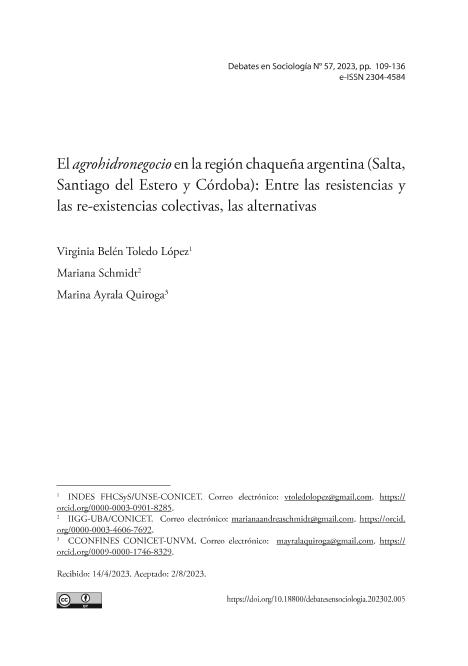Artículo
En Argentina, las provincias de Córdoba, Salta y Santiago del Estero se constituyen en casos de gran significancia en el contexto del avance del agronegocio, en virtud de la enorme pérdida de biodiversidad, la recurrente conflictividad territorial protagonizada por pueblos indígenas y campesinos y, más recientemente, contra el uso de agrotóxicos y sus consecuencias en la salud humana y no humana. El artículo se propone poner de relieve la dimensión hídrica involucrada en el modelo de agricultura hegemónico y visibilizar la construcción de alternativas que emergen en los territorios bajo estudio . A tal fin, abordamos las principales irrupciones del agrohidronegocio en la trama de la vida chaqueña, atendiendo a sus consecuencias territoriales, ambientales y sanitarias; para luego detenernos en un análisis de las principales formas que asumen las resistencias y las re-existencias. La propuesta metodológica se centra en un trabajo simultáneo con distintas técnicas de construcción y procesamiento de la información, tales como: sistematización y análisis de múltiples fuentes secundarias (periodísticas, estadísticas, legislaciones, informes de organismos estatales y/o privados, entre otras), junto con registros de campo y entrevistas en profundidad. In Argentina, the provinces of Córdoba, Salta and Santiago del Estero are cases of great importance in the context of agribusiness expansion, due to the spectacular loss of biodiversity, the frequent territorial conflicts carried out by indigenous peoples and peasants and, more recently, against the use of agrochemicals and their consequences on human and non-human health. The article aims to highlight the hydric dimension involved in the hegemonic agricultural model and to make visible the construction of alternatives that emerge in the territories under study. To this end, we address the main irruptions of agrohydrobusiness in the Chaco’s web of life, considering its territorial, environmental and health consequences, to then analyze the main forms assumed by resistances and reexistences. The methodological proposal focuses on simultaneous work with different data processing techniques, such as: systematization and analysis of multiple secondary sources (journalists, statistics, legislation, reports from state and/or private organizations, among others), along with field records and in-depth interviews.
El agrohidronegocio en la región chaqueña argentina (Salta, Santiago del Estero y Córdoba): entre las resistencias y las re-existencias colectivas, las alternativas
Título:
Agrohydrobusiness in the Chaco Region of Argentina (Salta, Santiago del Estero and Córdoba): Between the Resistances and the Collective Re-existences, the Alternatives
Fecha de publicación:
12/2023
Editorial:
Pontificia Universidad Católica del Perú
Revista:
Debates en Sociología
ISSN:
0254-9220
e-ISSN:
2304-4284
Idioma:
Español
Tipo de recurso:
Artículo publicado
Clasificación temática:
Resumen
Palabras clave:
AGROHIDRONEGOCIO
,
CHACO SECO
,
RESISTENCIAS
,
RE-EXISTENCIAS
,
ALTERNATIVAS
Archivos asociados
Licencia
Identificadores
Colecciones
Articulos (CCONFINES)
Articulos de CENTRO DE CONOCIMIENTO, FORMACION E INVESTIGACION EN ESTUDIOS SOCIALES
Articulos de CENTRO DE CONOCIMIENTO, FORMACION E INVESTIGACION EN ESTUDIOS SOCIALES
Articulos(SEDE CENTRAL)
Articulos de SEDE CENTRAL
Articulos de SEDE CENTRAL
Citación
Toledo López, Virginia Belén; Schmidt, Mariana Andrea; Ayrala Quiroga, Marina; El agrohidronegocio en la región chaqueña argentina (Salta, Santiago del Estero y Córdoba): entre las resistencias y las re-existencias colectivas, las alternativas; Pontificia Universidad Católica del Perú; Debates en Sociología; 57; 12-2023; 109-136
Compartir
Altmétricas




